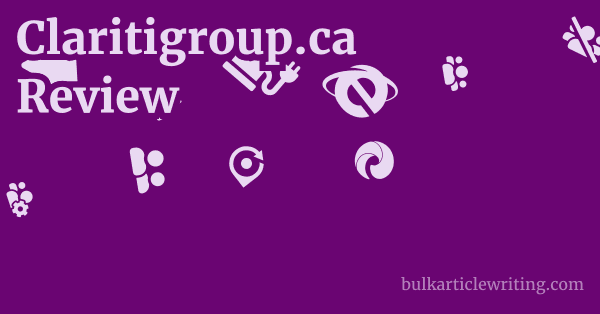When evaluating a professional service firm like Claritigroup.ca, especially within the context of ethical business practices, it’s crucial to scrutinize certain aspects of their offerings. While many services like HR consulting, career coaching, and leadership development are inherently beneficial and align with ethical principles, the inclusion of “Diversity, Equity & Inclusion (DEI) Services” warrants careful consideration.
Scrutiny of Diversity, Equity & Inclusion (DEI) Services
The concept of DEI, while ostensibly aimed at fostering fair and inclusive workplaces, has seen various interpretations and implementations. Some approaches to DEI can, unfortunately, lead to outcomes that contradict ethical principles of meritocracy and equal opportunity.
- Potential for Reverse Discrimination: Certain DEI initiatives, if not carefully structured, can inadvertently lead to favouring specific demographic groups over others, potentially resulting in reverse discrimination. This undermines the principle that individuals should be judged solely on their qualifications, performance, and character.
- Focus on Group Identity Over Individual Merit: An overemphasis on group identity markers (race, gender, etc.) can shift focus away from individual capabilities and contributions. Ethical workplaces should prioritize individual merit and competence above all else.
- Risk of Divisive Frameworks: Some DEI frameworks introduce concepts that can create division rather than unity within a workplace. Promoting grievance-based narratives or assigning collective guilt based on group affiliation can foster resentment and disrupt harmonious working environments. A truly ethical approach seeks to unite people based on shared values and goals, not to divide them by identity.
- Subjectivity in “Equity” Definitions: The term “equity” is often interpreted as achieving equal outcomes rather than equal opportunities. Pursuing equal outcomes can necessitate preferential treatment, which is fundamentally unjust and contradicts the Islamic emphasis on merit and justice for all, regardless of background.
- Lack of Universal Principles: Ethical business practices, particularly from an Islamic perspective, are grounded in universal principles of justice, fairness, and merit applicable to all individuals without bias. If DEI programs diverge from these universal principles, they can become problematic.
- Transparency in DEI Methodology: The Claritigroup.ca website mentions using “targeted surveys, interviews, and focus groups to gather DEI demographic data and reveal blind spots and strengths.” While data gathering is normal, the crucial aspect is how this data is interpreted and what actions are recommended. Without transparent methodology and a clear commitment to merit-based outcomes, there’s a risk of implementing practices that are not truly equitable or just.
The Importance of Meritocracy and Justice
From an ethical standpoint, particularly within an Islamic framework, meritocracy and justice are paramount.
- Meritocracy: Individuals should be hired, promoted, and rewarded based on their skills, qualifications, effort, and performance, not on their demographic attributes. This ensures that the most competent individuals are in the positions where they can contribute most effectively.
- Justice (
Adl): This principle demands fairness and impartiality in all dealings, treating all individuals justly without favouritism or prejudice. Any policy or initiative that introduces bias based on group identity, rather than individual merit, is a deviation from true justice. - Equal Opportunity vs. Equal Outcome: Ethical approaches advocate for equal opportunity for all to thrive and succeed. However, striving for equal outcomes often requires interventions that are inherently unfair, as individuals have different talents, efforts, and life choices that lead to varied results.
Given these considerations, potential clients, especially those with an ethical lens, should thoroughly inquire about the specific methodologies and philosophies underlying Claritigroup.ca’s DEI services. It is imperative to ensure that any proposed DEI initiatives genuinely promote fairness, equal opportunity, and individual merit, without introducing discriminatory practices or divisive ideologies. The focus should always be on building unified, productive workplaces where every individual is valued for their competence and character.
|
0.0 out of 5 stars (based on 0 reviews)
There are no reviews yet. Be the first one to write one. |
Amazon.com:
Check Amazon for Claritigroup.ca Ethical Considerations Latest Discussions & Reviews: |

Leave a Reply